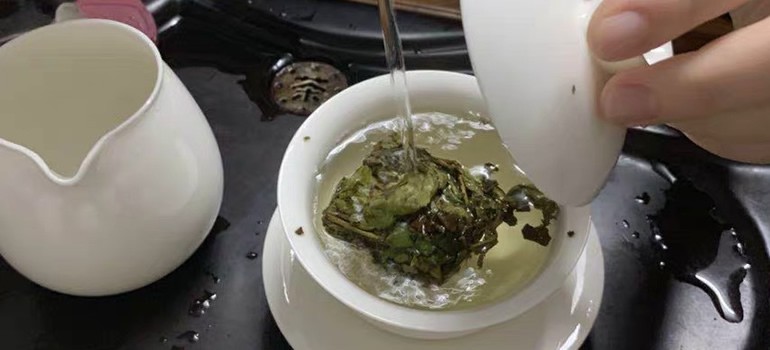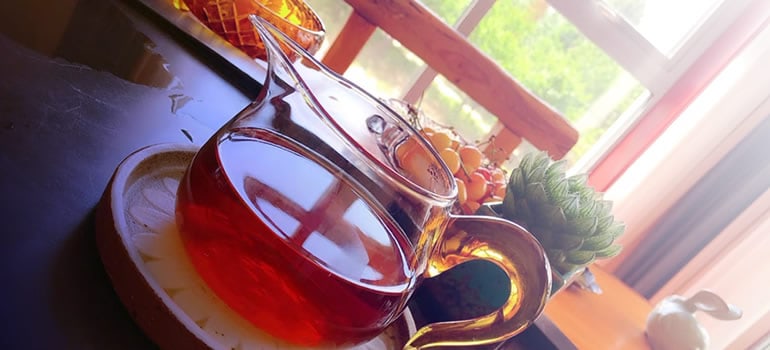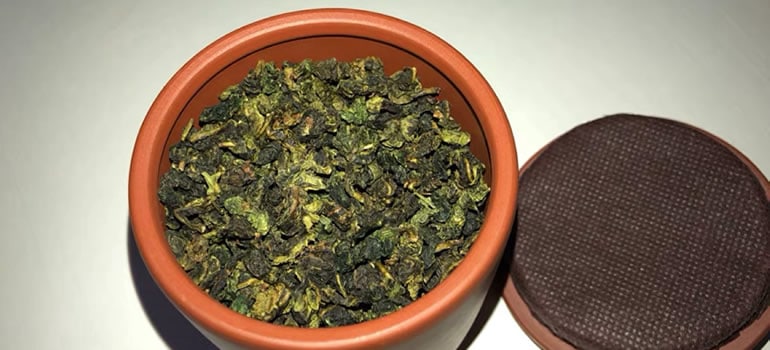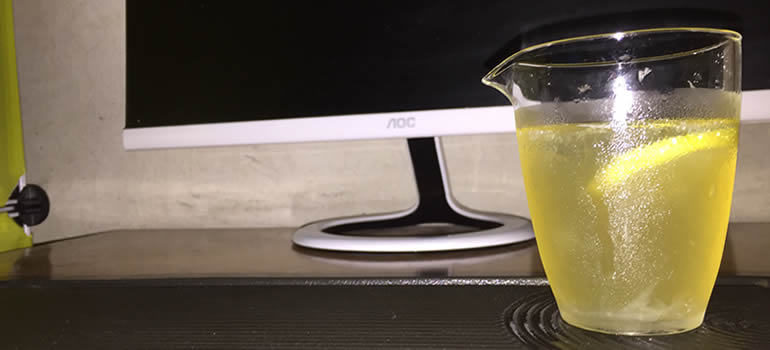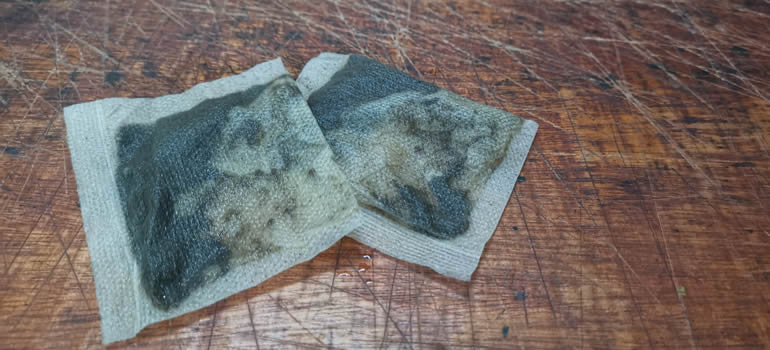
What do you usually do with your tea bag?
Do you just throw it away? Well, you can, but do you also squeeze the bag to get out every bit of tea out of it? A lot of people do it.
Even I used to do that for quite some time. But after a while, I realized that maybe this is not such a good idea. So not long ago, I set out to do a little research on the topic and see what information I will find.
Should you squeeze the tea bag or not? The tea leaves inside the tea bag have a higher content of tannins. If you squeeze the tea bag, you will have them released in your tea. Squeezing the tea bag will make the taste of your tea more bitter, astringent.
Okay, there may be a bit more than that, but this is precisely what we are going to explore in this article. So the next time you are facing the decision of what to do with the tea bag in your cuppa, you will know what to do.
How Do Tea Bags Work?
Tea bags are used to keep the tea leaves from spreading out uncontrollably in your tea. A tea bag is basically a tea infuser.
It is made from different materials that have porous properties which will allow the hot water to get in contact with the tea leaves and as the leaves steep in the water they will release their flavors and various nutrient compounds.
The most common materials used for tea bags are:
- Filter paper;
- Food-grade plastic; and
- Silk and silk cotton.
Tea bags usually come in rectangular folded shapes.
However, recently, the tetrahedron-shaped tea bags have been getting increasingly more popular. Tetrahedron may sound very confusing so just imagine a pyramid-shaped tea bag.
This shape is a bit controversial as it is believed to be able to provide better and faster steeping and better flavor and aroma infusion.
It is also a bit harder to actually squeeze a pyramid-shaped tea bag compared to the regular ones.
Should You Squeeze the Tea Bag?
For several years I used to squeeze the tea bags thinking that way, I will be able to get more of the tea’s flavor in my cup of tea. But then something interesting started to happen.
A few people told me that I shouldn’t really be doing that. And on several tea bags, I was surprised to discover instructions which explained not to squeeze the tea bags after steeping them in the water.
‘Very interesting,’ I said to myself. ‘So what happens if I do?’
Altering the Taste of the Tea
The first reason against squeezing the tea bag is going to be the taste.
Squeezing the tea bag may potentially ruin the taste of your tea.
The tannins that have built up and stayed in the tea leaves inside the tea bag will get in the tea and make it significantly more acidic and astringent.
And the higher tannin content may even make tea appear cloudy.
It May Be Considered Bad Manners
In some places, this may be considered bad manners, and it is really looked down upon.
So if you want to make an excellent first impression, since it is really long-lasting, maybe forget about squeezing the tea bag just for now.
The Tea Bag May Tear Apart
As we have seen, tea bags are frequently made from fragile and very delicate materials which can tear quite easily.
Even if the chances are slim if it happens, this is a recipe for a mess, and it may also ruin your whole cup of tea by filling it up with floating tea leaves.
A Potential Hazard
And last but not least, tea is hot.
The tea bag has been sitting in the hot cup of tea for at least a few minutes, and the chances are you may burn yourself.
Is Drinking Tannin a Bad Thing?
As we have seen, there are a few common reasons why you shouldn’t squeeze the tea bag.
But the most significant one is, of course, the fact that you will release high amounts of tannins in your tea. So is this actually dangerous?
What Is the Purpose of Tannins?
Tannins are a natural compound found in the tea leaves and other plants.
Even though we may like the slightly bitter taste it has, plants actually produce tannins as a self-defense mechanism against predators.
What Types of Tea Have Tannins?
All the different types and varieties of tea that come from the Camellia sinensis plant will contain varying levels of tannins in them. The level will depend a lot on the variety of the tea, the processing methods used and steeping and brewing time and temperature.
This includes green tea, black tea, oolong tea, white tea, and more.
The next thing you may wonder is how about herbal teas? Interestingly enough, herbal teas may also contain varying levels of tannins.
This includes chamomile, cloves, sage, thyme, hibiscus, turmeric, yerba mate, peppermint, and more.
Are Tannins Good?
Tannins are a potent type of antioxidant.
Consumed in moderation, they may be beneficial in staying in good health.
Tannins are not reserved just for tea. They can be found in different types of food like cheese or nuts, for example.
Are Tannins Bad?
Tannins are considered to inhibit the body’s ability to absorb iron, in particular, the non-heme iron which is found in vegetables. So tea with a higher amount of tannins inside will potentially be worse for iron absorption.
Some data points out that black tea may be able to inhibit the absorption of iron up to 79 to 94%.
One study found out that timing is also important. Drinking your black tea, for example, while you are eating will decrease non-heme iron absorption. Alternatively drinking the same tea one hour after the meal will not inhibit iron absorption to the same extent.
Tannic Acid vs. Tannins
This is a somewhat controversial topic. Tannic acid has been talked about very frequently. There is even a lot of information online where people will warn you against drinking too much tea as it contains tannic acid.
This also holds true for squeezing the tea bag as it suggested it will release high amounts of tannic acid.
On top of that, both terms, tannic acid and tannins are frequently used interchangeably.
But is tannic acid the same thing as tannins? Just because two words sound similar doesn’t mean they are the same thing, right?
Tannins are a type of plant polyphenol. Tannic acid, on the other hand, is a type of tannin. Despite that, they are fundamentally different, and they have been incorrectly used for a long while.
The type of tannins found in tea are usually called catechins, and they are not used for the manufacturing of tannic acid.
Tannic acid is used for tanning leather, dyeing cotton, protecting wooden furniture, ink production and more.
Often people confuse one with the other, especially when it comes to talking about black or green tea. This happens mainly because we like to describe tea as being ‘tannic’ or ‘acidic’ when we refer to its bitter taste.
Tea does contain tannins, but it does not contain any tannic acid.
Can Using Tea Bags Be Dangerous?
Tea bags are not so innocent as they may first appear.
In fact, it was found that tea bags may contain up to 25% plastic in them. So what exactly is plastic doing in our tea bags?
As it stands out, manufacturers use polypropylene which is a type of plastic in order to seal and keep the tea bags together.
Granted the amounts of plastic are going to be small, but regardless polypropylene has been proven to cause various adverse effects on the body.
Another case in point is that some tea bags can contain epichlorohydrin, which is a known carcinogen.
This is just another point in case of not squeezing your tea bag as the hot water may have already led to some of the chemicals leaching into the water and additionally squeezing the tea bag can release even more of them.
All these chemicals and plastics are even turning the tea bags in an environmental hazard as they are not biodegradable.
The best way to avoid that would be to go with loose leaf tea.
Resources:

